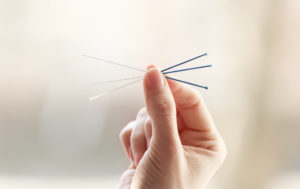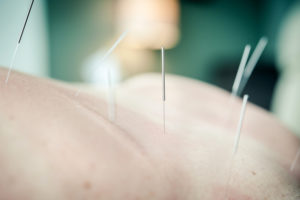AFRAID OF ACUPUNCTURE? DON’T BE
Everything You Need to Know About Acupuncture Needles

When we say ‘acupuncture’, your first thought is likely ‘needles’, right? When thinking of needles, most of us immediately think of pain, but some needles can actually bring healing and relaxation.
Acupuncture is a key element of Traditional Chinese Medicine, designed to help restore balance to the qi, or energy pathways in the body that are causing negative physical and mental symptoms. Acupressure points along the meridians, those pathways, can be stimulated by needles to rebalance the flow of qi and ultimately restoring health.
There are many fears and misconceptions surrounding acupuncture in the Western countries. The biggest fear is of potential pain of the acupuncture needles themselves. Images of people with a ton of needles sticking out from all different directions can definitely be an unfamiliar sight! Plus, won’t all those needles cause you to start bleeding all over?
We answer these questions and more so you can be prepared with everything you need to know before your acupuncture appointment.
Will Acupuncture Hurt?
 The combination of a thin needle and skilled acupuncturist result in most patients experiencing little to no physical pain. Most people don’t even realize when the needle is inserted. The physical sensations that most patients report occur after the needles are in and doing the work of treating pain points. Common experiences reported include feelings of itchiness, tingling, heaviness, a slight aching in the muscles, hyper awareness of a needle or passing sensations of heat or cold.
The combination of a thin needle and skilled acupuncturist result in most patients experiencing little to no physical pain. Most people don’t even realize when the needle is inserted. The physical sensations that most patients report occur after the needles are in and doing the work of treating pain points. Common experiences reported include feelings of itchiness, tingling, heaviness, a slight aching in the muscles, hyper awareness of a needle or passing sensations of heat or cold.
It is rare that any bleeding will occur during an acupuncture treatment. The needles are so thin that they are unlikely to draw blood or leave marks on the skin. After a treatment, most patients don’t show any physical signs that acupuncture was administered.
How Far Do Acupuncture Needles Go In?
Most often, the acupuncture needles are only inserted between 1/16 to ¼ of an inch into the skin. However, they can sometimes be inserted up to several inches.
The depth each needle will be inserted often depends on the part of the body in question. For example, areas with a lot of muscle mass or excess fat may require a deeper insertion to reach the acupuncture point. The nature of the condition being treated, along with the age and size of the patient, plus the personal style and training of the acupuncturist are also factors at play.
How Big are Acupuncture Needles?
 Needles used for acupuncture are much smaller than the needles you might be used to seeing in the doctor or dentist’s office. They tend to be about the length of a tube of chapstick, with much of that length devoted to the handle for the acupuncturist to hold. The actual needle is very thin, so much that it is quite flexible and is easily bent from side to side when touched. Most people don’t even feel the needle when it’s inserted!
Needles used for acupuncture are much smaller than the needles you might be used to seeing in the doctor or dentist’s office. They tend to be about the length of a tube of chapstick, with much of that length devoted to the handle for the acupuncturist to hold. The actual needle is very thin, so much that it is quite flexible and is easily bent from side to side when touched. Most people don’t even feel the needle when it’s inserted!
Are Acupuncture Needles Hollow?
Acupuncture needles are solid. The only needles that require a hollow center are the ones used to inject or remove liquids. Most needles we’re familiar with are hollow such as the ones used to administer vaccinations or to draw blood. Acupuncture needles, on the other hand are only meant to be inserted in the body to stimulate muscles and reorient qi, or energy pathways.
What to Expect From an Acupuncture Appointment
 While each acupuncture facility will come with their own unique style and details, the general process of an acupuncture appointment is often the same. When you arrive on the day of your appointment, plan to fill out some paperwork before meeting your acupuncturist. You’ll then have a consultation to determine the best course of treatment. Make sure you share all details about current conditions and any medications you’re currently taking.
While each acupuncture facility will come with their own unique style and details, the general process of an acupuncture appointment is often the same. When you arrive on the day of your appointment, plan to fill out some paperwork before meeting your acupuncturist. You’ll then have a consultation to determine the best course of treatment. Make sure you share all details about current conditions and any medications you’re currently taking.
Next, you can expect to have to adjust or remove clothing to provide the acupuncturist access to the troubled areas. The practitioner will clean the skin with alcohol and then begin inserting the acupuncture needles. Be sure to communicate with your acupuncturist to express your needs to achieve the most comfortable experience.
Practitioners will leave the needles in place for anywhere from 15 to 35 minutes, depending on your treatment plan. Plan for your acupuncturist to leave you to rest and check in a few times over the course of treatment. Many will also provide patients with a way to alert them if you needed adjustments or assistance, often with a bell or pager.
Once the needles are removed, your acupuncturist, or another Traditional Chinese Medicine practitioner may also suggest herbs, physical movements, nutrition or lifestyle adjustments to try to improve your health.
Afraid of Needles? Here Are Some Tips
Fear of needles is one of the most common complaints acupuncturists receive. Chances are your acupuncturist is very familiar with helping patients become more comfortable with the idea of needles. Be sure to express your feelings and don’t be afraid to let your practitioner know what you are and aren’t comfortable with.
A few other tricks to try at your first acupuncture appointment to overcome a fear of needles? First, don’t call them needles. If your brain immediately recalls bad memories of getting injections or blood draws when you think of needles, try retraining your brain when it comes to acupuncture. Whether you call them “pins”, or “healing sticks”, try to create a positive connotation with acupuncture needles to reorient your instincts.
You might also feel more comfortable with needles if you have a chance to familiarize yourself with them or compare them with medical needles. Seeing and feeling how small they are in comparison can greatly help ease your nerves.
A final tip is to move around a bit once the needles are inserted. Lying still and silent may leave too much space for your mind to run wild. Small movements like tapping your fingers or swaying from side to side can be enough to distract your brain.
Acupuncture is a key component of TCM and can provide relief to many conditions and diseases. Overcoming your fear of acupuncture needles can be the gateway to greater health and wellness!
Comments (0)
Leave a reply
You must be logged in to post a comment.




